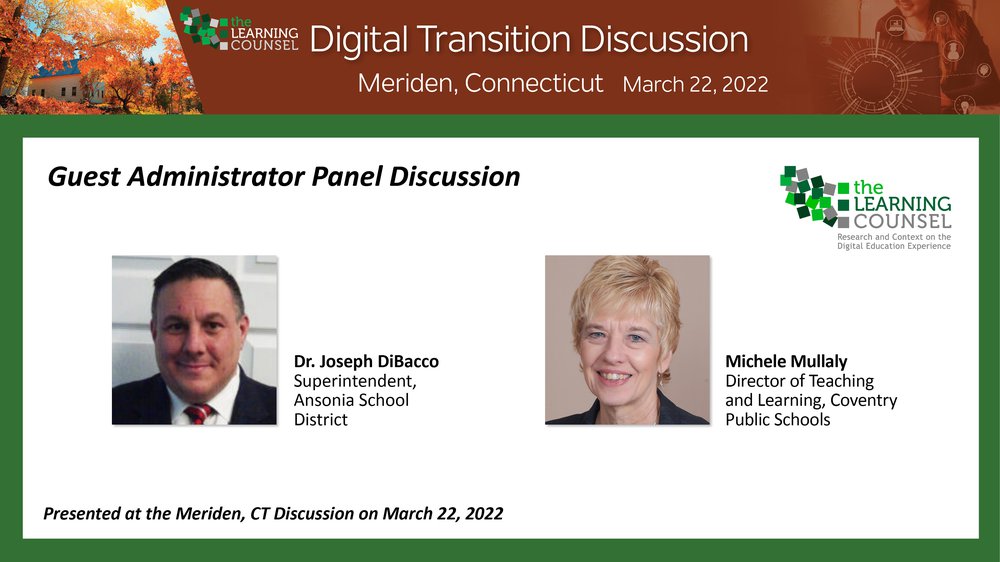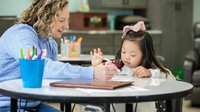Learning Counsel members love our Guest Administrator Panel Discussions, primarily for a couple reasons. One, these panel discussions feature some of the brightest minds in education. And two, no answers are out of bounds. Our members know that they will get the unvarnished truth, and that this truth is designed to edify our districts and help us solved the challenges, big and small, that we now encounter.
Moderator LeiLani Cauthen, CEO and Publisher at the Learning Counsel, said, “We talked a lot about the future today, and I threw a few of you for a loop talking about the fact that perhaps the future will be a different structure. But it's not a structure that no one's ever seen before. It's just something that would sort of be Uberized, with students on their own paths, and then manage to speed up on or slow down for one another. And it's the disaggregation of the classroom into something that looks a bit like being online in big study halls, but it is focused on the humanness of the human intersection.
And when do we come together,” asked Cauthen. “That's all predicated on what we looked at as a research institute over the course of the pandemic. What do people really want? What's happening in all these other markets, where, if we're going to come together, it should be for a very good reason, otherwise I’ll just buy it on Amazon. So, it has really come down to: we're trying to be normal, but it's not really normal. What do we need to be? What is the structure of the future?”
Dr. Joseph DiBacco, Superintendent at the Ansonia School District replied, “I think we must look at bandwidth and capacity of staffing. And we also need to ask, are people ready for this monumental shift? Listen, I'm a number one proponent of, ‘Let's spin everything on its head and find another way we can be more effective, more efficient and eliminate waste and redundancies.’ And there must be a more efficient way we could do things, and maybe more personalized for every kid. And that then goes to another point that you brought up as well, the fact that a lot of my teachers had great relationships before the pandemic. I do think technology has to be purposeful and deliberate.
“You just can't view kids in class and turn their video screen off. You have to manage your time and your space, and you have to manage what's happening. And what also happens is people - teachers and students - can disconnect by opening up that laptop or phone. And it actually creates that barrier. It creates that disconnect. What we see happening is there's a huge SEL portion where we need to know our learner. In a previous life, I was a special ed teacher and every one of my special ed students had their own learning paths. They had their own IEP. And I never understood why every student doesn't have their own pathway, their own plan.
“And then, are they ready for this global marketplace? Are they ready for the gig economy? Do they have the skillset necessary? Are we putting them out? And are they equipped to either work in the world or go to post-secondary ed? if the answer is no, then what are we doing?”
Michelle Mullaly, Director of Teaching and Learning, Coventry Public Schools added, “I think as you suggested previously, looking for easy entry points, for ways to make modifications and prescribe more differentiation and personalization is probably a way to go in light of the many constraints in public education. I think about acceleration and personalization, pace in reading and math, in ways that can be done. But I also think, why do we come? Why do we want to be in the same space? Because how do we solve problems? We work together solve problems. And that's what happens in the real world, wherever you look, whatever path you take. So for me, my vision is much more interdisciplinary project-based learning for students, where it's focused on student interest, it's focused on student voice, and student choice. It's focused on community problems.
“It's focused on reaching beyond the walls of the school, using technology to network with experts around the country. Presenting, not just for my teacher, or the couple of kids in my class, but for real world audiences. We're speaking, we're listening, we're using academic vocabulary. We're writing, we're presenting, we're integrating technology in a way that helps us think and develop as learners that we haven't had before. Kids’ learning will accelerate when they're involved with problems that they're engaged with in the real world.”
You’ll enjoy this Guest Administrator Panel Discussion. It’s real-world experts sharing their real-world solutions to the challenges they’ve encountered in their districts. Their advice is practical, and you’ll be practically bursting at the seams to take that advice back home so you can use it in your own school or district.











